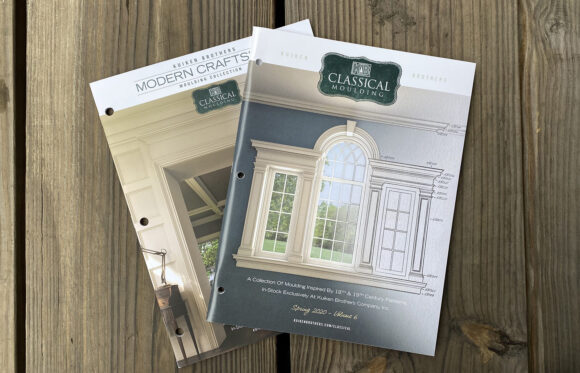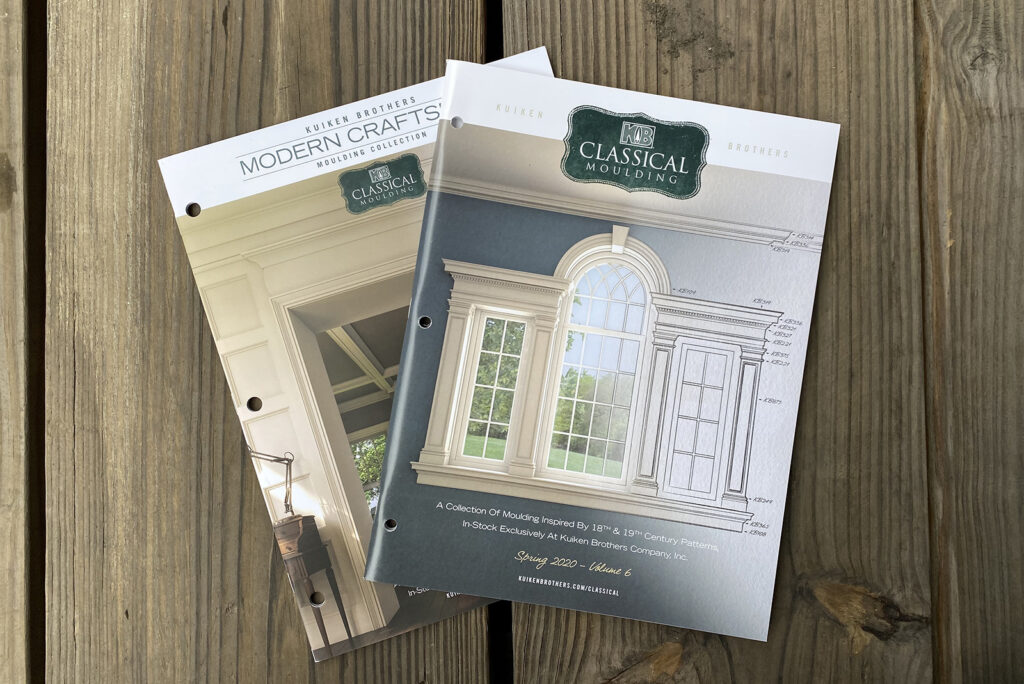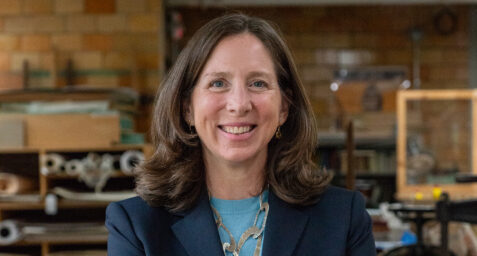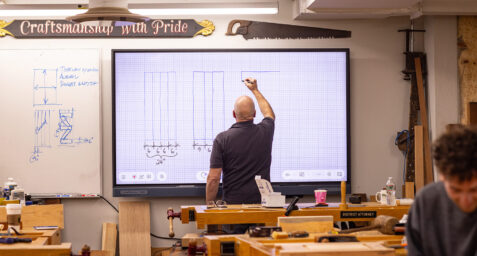Partner in Craft Spotlight: Kuiken Brothers

Our Partners in Craft program recognizes corporations and small businesses across industries that support the School. Meet one of our newest industry partners, Kuiken Brothers Company, Inc., a family-owned residential and commercial building materials supplier in business since 1912.
We spoke with Ryan Mulkeen, Vice President of Marketing & Communications at Kuiken Brothers, about how they connected with NBSS through a graduate, why they support the School, what advice they have for our students, and more.
How did you discover the School?
We learned about NBSS in 2008 from one of your alumni, Brent Hull PC ’93 of Hull Works. We’re a residential and commercial building materials supplier here in New Jersey and New York started in 1912, and we’re a family-owned business.

At the time, we were looking to differentiate ourselves in the market, and we had a big catalog of moulding profiles. We had a successful program and a lot of interest in our moulding profiles, but there were no real differentiators from other suppliers in the marketplace. So we decided we needed to tell the story a little bit differently. We knew Brent was a great resource for moulding and we had read a number of his published books. We reached out to him to help us refine our stock moulding collection and hopefully create a story about them to share with our customers.
Ultimately, it resulted in the creation of our Classical Moulding Collection, which is a series of 90+ historically-inspired profiles from the Early American Georgian, Federal, Greek Revival, Colonial Revival, and Craftsman styles. In getting to know Brent, he always spoke very highly of North Bennet Street School. And recently, Brent encouraged us to make the connection and support the School.
Why do you support NBSS?
We’ve long heard about NBSS and long admired it. Continuing education in building materials supply is critical. Connecting with craftsmen and craftswomen who have an awareness of a quality product is critical. Understanding how to install those products and how they work with others to create an assembly is crucial. Knowing that there is an institution fostering continuing education and offering educational opportunities for builders and remodelers is a home run for us.
We both have a long history as organizations: we’re now over 110 years old ourselves. North Bennet has a similar focus on history and exploring the past. Having an awareness of the past is critical to our mission and how we go to market with our sales, operations, and administrative teams.
History is a big part of our organization, and it’s a big part of the Kuiken family, with a motto of “honesty, integrity, professionalism.” That seems to be lost in the modern era. If people would look to the successes of the past, they would see that there are some core values that were relayed from one generation to the next. Seeing that at North Bennet Street School, it aligns with our motto and our mission as an organization.
What is an interesting trend in your field you’ve noticed recently?
On the wooden moulding side of things, there was an uptick in modern craftsman style, which is a very simple, plain moulding collection. People were gravitating towards it. But we’re now starting to see a return to and growth of our classical moulding collection; and interest from around the country.
I’ve seen a lot of interiors exploring the past a bit more. While modern design hasn’t gone away, there’s an interest in a more traditional look and feel—homey, cozy details—very different from super clean and minimal. There’s a groundswell happening. We’re certainly seeing it in the interest in specific profiles, like early American, Georgian, Federal, and Greek Revival.

When we post photos on our Instagram account (@kuikenbrothers) of those moulding profiles, people say, “Whoa, I didn’t know that stuff still exists!” They thought they had to have it all custom-made, and the fact that they can grab it off the catalog and incorporate it into their design makes them different from everybody else doing the modern farmhouse trend. Their homes feel comfortable, like the ones they grew up in here on the East coast and New England, where we have a lot of history to draw from.
Complete the sentence: If I weren’t working in the building materials industry, I’d be a _.
I had never envisioned being in the supply side of the building trades, so it’s difficult to say. Personally, I’d rather be a finish carpenter, I’d love to be in the field. We’re on the supply side in logistics and working with manufacturers; we’ve developed our own moulding collection in-house. Jumping out of that, it would have been amazing early on to have learned more about installation and building and working with clients to bring traditional and classical designs back to life. I’m envious of the students and alumni from that vantage point.
What’s something that has inspired you recently? Could be a whole book, an article, video, or any other bit of whimsy, information, or inspiration.
The video content that Brent Hull is presenting on a daily basis is really intriguing. His ability to strip back the past and highlight certain details and characteristics is a forgotten art that’s not talked about in schools at all. It’s only talked about in certain circles and there’s a group of people that understand it, but not many. The content on his YouTube channel and his Instagram accounts has been eye opening. He hooked us early on, and once you listen and realize what he’s talking about in terms of scale and proportion, you look at buildings and interiors completely differently. You understand history and where things started in a whole new light.
What motivates you? And/or what do you love about your work/field?
My role here is marketing, and in building materials supply, I’m exposed to every single product line we sell. So I don’t come to work and do the same exact thing every single day. I’ve rarely had two days in a row that are book matched, if you will—nothing looks the same day-to-day. There’s always something new to learn, a different way to present something to someone else and seeing how they learn or perceive things. From a marketing standpoint, it’s finding ways to tell that story to a wide audience, and gaining acceptance so people want to want to build something with that material.

Doug Kuiken, one of the company’s owners, always says, “At the end of the day, we’re in the shelter industry.” To be able to be part of providing housing for people—or materials that go into that housing—we’re going to build something that will hopefully last 100 years, where people will have memories. Products we’re selling might become someone’s mantle, and during the holidays, that family will build a fire and put their stockings up on it. Looking beyond simply selling products is a meaningful experience. It’s not just about the sale, it’s about what it can become.
What life or career advice can you share with our students and graduates?
Ask questions. Ask a million questions. Never stop trying to think outside the box.
Look outside our industry as well. Our industry can be very slow to change. Look at how other industries are doing things, and how that could be incorporated into what you do. As a supplier, we don’t look at our competitors and try to do what they do. We look outside the industry and see how other people are speaking and communicating from a marketing standpoint, how they’re visually representing ideas and catching people’s attention.
There will be mentors you’ll look up to. And there will also be mentors who you’ll remember what they do—and don’t do. I’ve had bosses where I made note of approaches I didn’t agree with, to make sure that when I was at a similar point in my career, I wouldn’t do things the same way.
There’s always new things to learn. Be open minded. It’s not always about you; think about the team that you rely on, people who are going to be part of your success.
Kuiken Brothers being in business for over 110 years is due to our success in partnering with the building community. We don’t look at our customers as a sales opportunity, but more of a relationship opportunity. If we treat our customers right, they’re going to be life-long partners—and we do have generational customers. It’s always about doing the right thing, even in critical situations where something goes wrong. When we put in the time and effort to have good relationships with customers and clients, and grow those relationships, those are the most successful relationships we have. Thinking about the big picture all the time is critical: your customer’s success is your success.

